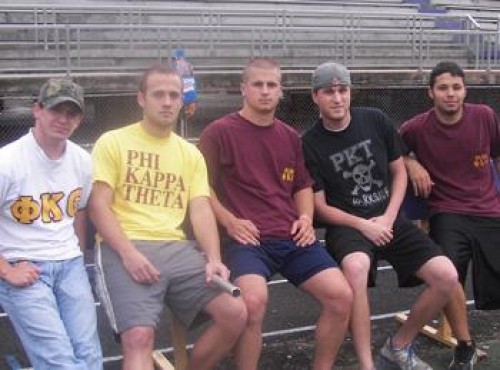Reynauld Songy
May 7, 2007Steve Collins
May 9, 2007When parents send their young ones off to college, they hope their children will get a meaningful education and social enhancement needed to succeed. And while many colleges deal with dubious titles such as “Nation’s Top Party School,” at Nicholls State University Greeks have discovered alcohol and drug abuse is not an issue among its members n community relationships are.
Nicholls State University Greek Life Director Tom Stephens said, “Every parent wants their child to get a meaningful education, but they also want them to participate in activities that promote leadership and builds character.”
Several of the Greeks agree. Members of the Phi Kappa Theta Fraternity said they joined the fraternity to be a part of an organization that promotes brotherhood as well as leadership among its members.
“We don’t have a drug and alcohol issue in the Greek community on campus. Our biggest problem arises when we fail to become a part of the positive aspects of Nicholls,” said 19-year-old Brandon Greene, a member of Kappa Alpha.
Admittedly, there have been minor infractions on Nicholls’ campus in which alcohol use was a factor. Stephens said, however, in the past seven months that he has headed the Greek program, there have not been any.
“I am still getting to know the students and they are getting to know me. I see that most of the students still live with their parents. I figure that they have that ‘strong parental guidance’ that steers them away from drugs and alcohol. For those students that live independently, I figure they are mature enough to take care of their responsibilities and not waste their time on drugs and alcohol,” Stephens said.
This whole assessment scenario started back in 2001, when Deno Curris, president of the American Association of State College and Universities, invited the nation’s higher education leaders to Washington, D.C., for what he called a “Franklin Square” meeting.
The meeting resulted in the formation of a document n “A Call for Value Congruence,” which outlined the bold stance universities would take to combat alcohol abuse and other social problems blamed for weakening Greek communities on the college campuses.
Out of 15 schools in the University of Louisiana System, Nicholls State University opted to serve as a pilot school for Curris’ doctrine.
Experts from the association’s coalition assessment team probed the campus in search of evidence that the Greek community is “doing what they say they do,” Curris said in a release after the Franklin Square meeting.
Stephens said he knew that alcohol and drug abuse were not negative factors diminishing Nicholls’ Greek community. Instead, an apathetic attitude toward social and community involvement among fraternity and sorority members has tainted the univerity’s Greek program.
The assessment team spent April 19-20 at Nicholls assessing the pilot program’s success so far, Stephens said. The group found that Nicholls’ Greek life needed a minor facelift.
“The Greek community needs to reshape its interpersonal relationship with the university, develop more leadership skills among the Greeks and build a better civic relationship with the community,” Stephens said.
The director noted that Greek advisors, student leaders and university administrators will soon formulate a plan that gets the fraternities and sororities more involved in the positive aspects at Nicholls.
“We need to let the university and the non-Greeks know that we are here. Greeks represent four percent of the student population. Our main problem is recruitment because the students don’t see us as one of the leading organizations on campus when we should be,” Stephens said.
Nicholls has 10 social fraternities and sororities, all 10 of which have taken the advice the American Association of State College and Universities offered about Greek life on Nicholls campus to heart, according to the program’s director.
“Many of the organizations have already started correcting some of the problems the experts pointed out. They are coming to me with suggestions on how we can turn our program around and be more community-friendly,” Stephens said.
Student leaders of the Greek program held a rush meeting where the admission grade point average was increased by three points, going from a 2.0 to a 2.3 GPA, Stephens noted. Also, the leaders signed up to volunteer for more community-based projects, including the The Road Home and Habitat for Humanity.
“During Greek Week, the students raised more than $5,000 for a Nicholls charity called Maggie’s Heart,” Stephens said.
Named after a young girl in the community who had a heart disorder, Maggie’s Heart started out as a Nicholls’ foundation program but has grown into a community-wide charity, Stephens said.
With the changes, Stephens said Greek members hope to see recruitment numbers improve. “The present-day generation has resorted back to the views of the 1960s when students felt that they were individuals and didn’t need a organization to define who they were as a person.”
According to national research, the director said experts predict membership in a Greek organization is expected to peak over the next 10 years. The numbers are based on the fact that today’s youth are socially plugged-in to community and social services, Stephens noted.
Improving Nicholls’ social and leadership aspects among the university’s fraternities and sororities will take some time, but Stephens said the Greek community is up for the challenge.
Staff photo by SOPHIA RUFFIN * Tri-Parish Times * Phi Kappa Theta members Gatlin Rodrigue, Zachary Norris, Max Smitko, Blake Acosta and Lance Brien pose during a break at Greek Week festivities.








